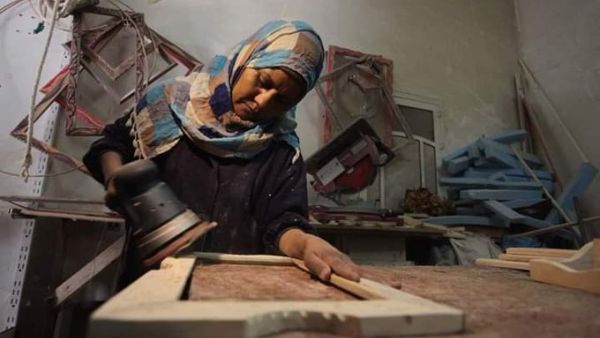Inside the alleyways of the Nuseirat camp in central Gaza, the gazes of passersby are captured by the steady steps by a woman in her forties toward her workshop.
There, Amal Ruqayyiq labors through the long hours of the day, operating heavy machinery that produces different forms of woodwork that she then sells in the market and in shops to provide for her children.
She has endured difficult circumstances in her life that have hardened and forced her to bear challenges surrounding her. She said that during the years of the second Palestinian Intifada in 2000, she was visiting her parents in the Nuseirat camp but an Israeli blockade on the area prevented her from returning home to her husband in Ramla city.
Soon after, her husband repudiated all of her rights and stopped sending her and her daughter money so that they could secure the bare minimum for sustenance. This was made worse by the fact that Amal’s parents are simple people with limited economic means. This pushed her to file for divorce and live with her daughter and make ends meet her own may.
During the years that followed the divorce, she attended several institutions that provide women with help finding work and took part in one project that gave her the chance to open her own woodshop. She remembers having participated in several vocational workshops, but found her passion in carpentry, especially since she had long dreamt of working in design.
Amal points out that she was able to produce a variety of artistic woodworks, mostly falling under the theme of the homeland. She produced models of the map of Palestine and the key to return, among others. She said that he competence and accuracy in what she produced made customers trust her, and they started coming back for more unique items.
As for her daughter, Amal told Asharq Al-Awsat that she is now 20 years old and suffers from a mild mental disability. Despite this, she insists on integrating her into society through a variety ways, because, Amal “believes that victory against circumstances and obstacles should be rooted in the spirit of every Palestinian woman because she is a partner in every detail of life, including struggle and labor.”
In her message to women on International Women’s Day, Amal said that during her years in carpentry, she has worked on enhancing the notions of strong women who are capable of taking back their rights from anyone who tries to violate them. She said she will continue to do so, knowing that women are the driving force of society.
According to local statistics, the living and social standards of Palestinian women in Gaza have dropped due to a variety of reasons, most importantly because it is a male-dominated society. The political, economic and social circumstances caused by Israeli siege and internal Palestinian division for more than 13 years have also made life difficult.
This article has been adapted from its original source.








